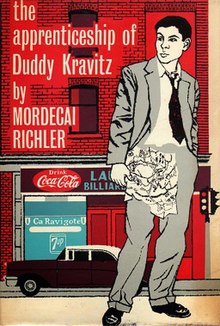The Apprenticeship of Duddy Kravitz (book)

First edition
|
|
| Author | Mordecai Richler |
|---|---|
| Cover artist | Bernard Blatch (design) |
| Country | Canada |
| Language | English |
| Publisher | André Deutsch |
|
Publication date
|
1959 |
| Media type | |
| Pages | 319 pages (first edition) |
| ISBN | |
The Apprenticeship of Duddy Kravitz is the fourth novel by Canadian author Mordecai Richler. It was first published in 1959 by André Deutsch, then adapted to the screen in 1974.
The satirical novel is set mostly in poor districts of Montreal, like St. Urbain Street, with mention of wealthier districts, like Westmount and Outremont. Parts of the story take place in the Laurentian Mountains, in the resort town of Sainte-Agathe-des-Monts and surrounding areas.
The novel focuses on the young life of Duddy Kravitz, a poor Jewish boy raised in Montreal, Quebec. Family, friends, lovers and teachers all contribute to Duddy's burgeoning obsession with power and money — desires embodied in the possession of land. As a child, Duddy learns from his grandfather that "a man without land is nobody," and Duddy comes to believe land ownership to be life's ultimate goal and the means by which a man is made into a somebody.
Duddy begins to move towards this goal by working for his Uncle Benjy. Their relationship is strained: Uncle Benjy, a wealthy clothing manufacturer with socialist sympathies, has always favored Duddy's brother Lennie, who wants to become a doctor. Uncle Benjy takes a dim view of Duddy's commercial ambitions, seeing them as avaricious and crass. During the summer after high school, Duddy takes a job as a waiter at a hotel in Ste. Agathe. He stumbles upon a beautiful and secluded lake while out with his soon-to-be lover and "Girl Friday" Yvette. A born entrepreneur, Duddy immediately sees that the lake has tremendous potential as the future site of a summer resort.
Duddy returns to Montreal and starts a company to produce bar-mitzvah films. To this end he hires Friar, a blacklisted (in the United States, for his communist tendencies), alcoholic, avant-garde filmmaker. Since Duddy's childhood, his father, Max, had told him stories about Jerry Dingleman, the local "Boy Wonder" whose rags-to-riches story is canonical among the residents of St. Urbain Street. Looking for help with his film company, Duddy attempts to engage Dingleman. The two travel to New York City, but Duddy fails to secure any assistance from the "Boy Wonder" who sees Duddy as a naive upstart and uses him to ferry a package of heroin across the Canada-U.S. border. On the way back from New York he does, however, meet Virgil, an amicable and trusting American with a consignment of pinball machines for sale. Back in Montreal, Duddy rents an apartment and an office for himself and Yvette and, as the plots of land around the lake he's dreaming of possessing go up for sale, his Laurentian land empire grows.
...
Wikipedia
